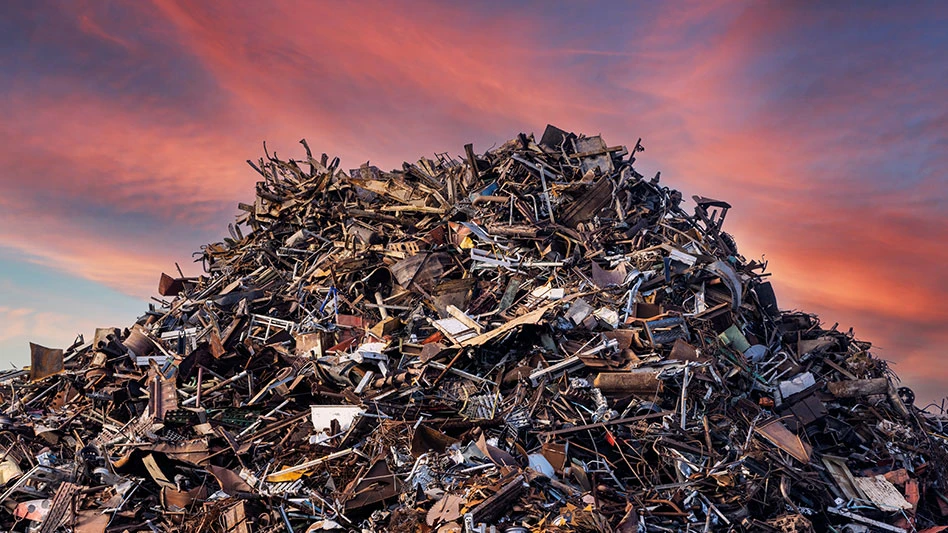The ferrous scrap spot market in the first 20 days of February allowed buyers to pay a little bit less per ton for their scrap, but the price drop was only about 4 percent. According to pricing survey data from the Raw Material Data Aggregation Service (RMDAS) that is compiled by Management Science Associates Inc. (MSA), Pittsburgh, national averages paid on the spot market for the most common scrap grades dropped from $17 to $21 in February.
 (Per gross ton for No. 2 shredded scrap, defined as .17 percent or greater copper content)Although prices dropped across the board for prompt industrial grades, shredded scrap and No. 1 heavy melting steel (HMS), mills still paid more than $400 per ton for all grades across all regions. There is sentiment in the scrap market that the slight dip in February may be temporary and not part of a longer skid.
(Per gross ton for No. 2 shredded scrap, defined as .17 percent or greater copper content)Although prices dropped across the board for prompt industrial grades, shredded scrap and No. 1 heavy melting steel (HMS), mills still paid more than $400 per ton for all grades across all regions. There is sentiment in the scrap market that the slight dip in February may be temporary and not part of a longer skid.
No. 2 shredded scrap (shred with more than 0.17 copper content) maintained a national average price of $451 per ton on the spot market, continuing to fetch higher pricing than it did throughout the second half of 2010. The national average drop of $21 per ton marked a 4.4 percent decrease from the $472 mills were paying the previous month.
Prices for the three grades covered in the RMDAS Index moved in fairly close sync across all three RMDAS regions (North Central/East; North Midwest; and South).
Pricing moved the least in the North Midwest region (consisting of Illinois, Iowa, Kansas, Minnesota, Missouri, Nebraska, Wisconsin and the northwest corner of Indiana), where prompt grades lost only $14 in value and No. 2 shredded scrap lost just $17 in value.
Scrap recyclers speculate that many domestic electric arc furnace (EAF) mills had completed building up their winter inventories by the February buying period, making them less likely to make spot purchases if the price was not to their liking.
Additionally, spot orders were unlikely to be placed from China or Taiwan in the first several days of February, as that nation’s factories and mills were largely shut down for the Lunar New Year holiday.
A scrap processor in the Upper Midwest says that as of late February, however, demand remains strong from mills and foundries in his region. “I’m having no problem selling steel scrap,” he comments.
Ongoing demand is being paired with obsolete scrap flows that have been slowed down because of weather obstacles in much of the United States in February. A scrap processor in Missouri says that, except for one three- or four-day thaw, most of February has provided difficult conditions for the peddlers who collect and haul scrap in rural counties.
That was in contrast to January, when the same Missouri recycler says the weather caused fewer interruptions, and scrap flowed across the scale at such a high rate that equipment and crews working overtime could not keep up with production.
Both scrap recyclers are uncertain how to gauge where March pricing is likely to go. “Mills are buying, but it looks like no one knows where prices are going in March,” says the Upper Midwest processor. “The initial sentiment was that it would go down, then sideways, and now people are saying maybe it’ll go up,” he says of ferrous pricing.
The domestic steel industry appears to be serving customers who are more eager for their products with each passing month. The American Iron and Steel Institute (AISI) has reported that in December 2010 steel mills in the United States shipped out 7.1 million net tons of finished steel.
The figure marks an 8.6 percent increase from the 6.5 million net tons shipped out the month before and a 17.8 percent increase from the 6.0 million tons shipped in December 2009.
For the entire year of 2010, the 83.4 million tons shipped by the domestic steel industry represented a 38.3 percent increase from the 2009 shipments of 60.3 million tons.
Globally, the New Year started off with a steel production figure for January 2011 that was 3 million metric tons above the total output for the month before.
According to the World Steel Association (Worldsteel), Brussels, in January 2011, 119.4 million metric tons of steel were made in the more than 60 nations that report to Worldsteel. That figure surpasses the 116.2 million metric tons made in December of 2010.
Steel producers in China provided some 40 percent of that increase by ramping up output by 1.3 million tons. Steelmakers in Brazil, Japan, Germany and Spain reported production increases ranging from 300,000-to-500,000-metric-tons range for January vs. the month before, helping contribute to the global increase.
Sponsored Content
Labor that Works
With 25 years of experience, Leadpoint delivers cost-effective workforce solutions tailored to your needs. We handle the recruiting, hiring, training, and onboarding to deliver stable, productive, and safety-focused teams. Our commitment to safety and quality ensures peace of mind with a reliable workforce that helps you achieve your goals.
Sponsored Content
Labor that Works
With 25 years of experience, Leadpoint delivers cost-effective workforce solutions tailored to your needs. We handle the recruiting, hiring, training, and onboarding to deliver stable, productive, and safety-focused teams. Our commitment to safety and quality ensures peace of mind with a reliable workforce that helps you achieve your goals.
Sponsored Content
Labor that Works
With 25 years of experience, Leadpoint delivers cost-effective workforce solutions tailored to your needs. We handle the recruiting, hiring, training, and onboarding to deliver stable, productive, and safety-focused teams. Our commitment to safety and quality ensures peace of mind with a reliable workforce that helps you achieve your goals.
Sponsored Content
Labor that Works
With 25 years of experience, Leadpoint delivers cost-effective workforce solutions tailored to your needs. We handle the recruiting, hiring, training, and onboarding to deliver stable, productive, and safety-focused teams. Our commitment to safety and quality ensures peace of mind with a reliable workforce that helps you achieve your goals.
Sponsored Content
Labor that Works
With 25 years of experience, Leadpoint delivers cost-effective workforce solutions tailored to your needs. We handle the recruiting, hiring, training, and onboarding to deliver stable, productive, and safety-focused teams. Our commitment to safety and quality ensures peace of mind with a reliable workforce that helps you achieve your goals.
Sponsored Content
Labor that Works
With 25 years of experience, Leadpoint delivers cost-effective workforce solutions tailored to your needs. We handle the recruiting, hiring, training, and onboarding to deliver stable, productive, and safety-focused teams. Our commitment to safety and quality ensures peace of mind with a reliable workforce that helps you achieve your goals.
Sponsored Content
Labor that Works
With 25 years of experience, Leadpoint delivers cost-effective workforce solutions tailored to your needs. We handle the recruiting, hiring, training, and onboarding to deliver stable, productive, and safety-focused teams. Our commitment to safety and quality ensures peace of mind with a reliable workforce that helps you achieve your goals.
| FEBRUARY 2011 Spot Pricing | ||||
| Total U.S. | North Central/East | North Midwest | South | |
| Prompt Industrial Composite | $476 | $477 | $476 | $475 |
| #1 HMS | $417 | $422 | $420 | $410 |
| #2 Shredded Scrap | $451 | $454 | $451 | $446 |
| #2 Shredded / Change vs. Month Before | -$21 | -$22 | -$17 | -$23 |
|
Spot buyers of ferrous scrap were able to pay from around $15 to $22 less per ton during the first three weeks of February, compared with the month before. Reported regional aggregated spot market prices per gross ton shown for each commodity are based on all Management Science Associates (MSA), Pittsburgh, Raw Material Data Aggregation Service (RMDAS) participants’ actual order data submitted to and processed by MSA as of the 20th of each respective “buy month,” rounded to the whole integer. A map of RMDAS regions is available at http://rmdas.msa.com, as is a further explanation of RMDAS methodology and an accompanying disclaimer. No. 2 shredded scrap is defined as containing 0.17 percent or greater copper content. The prompt industrial composite consists of an average of No. 1 bundles, No. 1 busheling and No. 1 factory bundles. Additional pricing information on each grade can be found at www.RecyclingToday.com. © 2011 Management Science Associates Inc. All rights reserved RMDAS is a trademark of Management Science Associates Inc. |
||||
Get curated news on YOUR industry.
Enter your email to receive our newsletters.

Explore the March 2011 Issue
Check out more from this issue and find your next story to read.
Latest from Recycling Today
- Altilium produces EV battery cells using recycled materials
- Brightmark enters subsidiaries of Indiana recycling facility into Chapter 11
- Freepoint Eco-Systems receives $50M loan for plastics recycling facility
- PET thermoform recycling the focus of new NAPCOR white paper
- Steel Dynamics cites favorable conditions in Q1
- Hydro starts up construction in Spain
- Green Cubes unveils forklift battery line
- Rebar association points to trade turmoil






